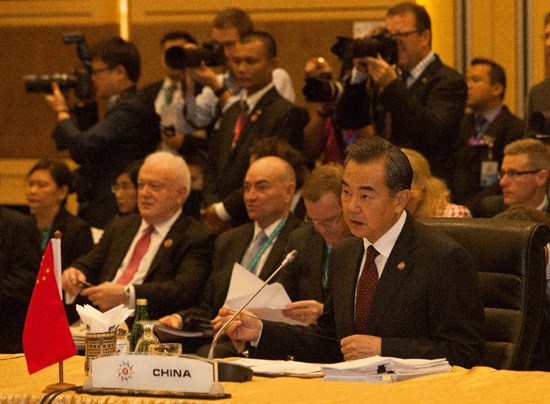
Chinese Foreign Minister Wang Yi (R front) speaks during the East Asia Summit Foreign Ministers' Meeting in Kuala Lumpur, Malaysia, on Aug. 6, 2015. (Xinhua/Chen Sihan)
Chinese Foreign Minister Wang Yi made clear China's stance on the South China Sea issue on Thursday, rejecting the claims of the Philippines, Japan and United States.
Speaking at the ASEAN Regional Forum (ARF), Wang said China felt imperative to speak the truth and make clear its stance as the South China Sea issue was raised by some countries at the ARF and the East Asia Summit Foreign Ministers' Meeting earlier.
"First of all, the general situation in the South China Sea is stable, and the possibility of a major conflict simply doesn't exist," he said. "Therefore, China is against any unconstructive words and deeds that exaggerate differences and stand-off, and create tensions. They do not comply with facts at all."
China has the same concern as other countries over freedom of navigation in the South China Sea, as most of China's merchandise is transported by the Sea, the Chinese minister said, noting that freedom of navigation there is very important to China, too.
Wang said, "China has always held the stance that parties enjoy freedom of navigation and flyover in the South China Sea according to international laws. China is willing to work with other parties in keeping freedom of navigation and flyover in the South China Sea."
With regard to the disputes over the Nansha Islands, Wang pointed out, "It is an old problem."
Islands in the South China Sea are China's territories as China is the first country to discover and name the islands, he emphasized.
The Chinese minister said this year marks the 70th anniversary of the victory of World War II, and 70 years ago China took back Nansha and Xisha Islands, which had been illegally occupied by Japan.
Highlighting that the Cairo Declaration and the Potsdam Proclamation, on which the post-war international order is founded, demanded Japan return the territories it had stolen from China, Wang said.
"The naval ships that were used by China to take back the islands were provided by the United States, our ally," he said, adding, "These facts must have been recorded in your respective archives."
"Till the 1970s, some countries began to invade and occupy islands and reefs following reports on oil reserves in the South China Sea, infringing the legal rights and interests of China. According to international laws, China is entitled to defend its own sovereignty, and rights and interests, and to make sure that the illegal actions infringing China's legal rights and interests wouldn't happen again."
Wang said the Philippines had failed to tell the truth when raising the South China Sea issue.
He said the Philippines alleges that Huangyan Island and other related islands and reefs in the South China Sea belong to the Philippines; however, the Treaty of Paris (1898), the Treaty of Washington (1900) and the Convention between the United States and Great Britain (1930) state clearly that the west limit of the Philippine territory is 118 degrees east longitude, while Huangyan Island and Nansha Islands are obviously not Philippine territories as they are located completely west to the 118 degrees east longitude.
After independence, the Philippines' domestic laws and relevant treaties have all reaffirmed the legal effects of the above- mentioned three treaties and once again expressively defined that the west limit of the Philippine territory is 118 degrees east longitude, Wang said.
"But after 1970, the Philippines illegally occupied eight islands and reefs in China's Nansha Islands through four military operations. That's how the territorial disputes arose between China and the Philippines," Wang said.


















































